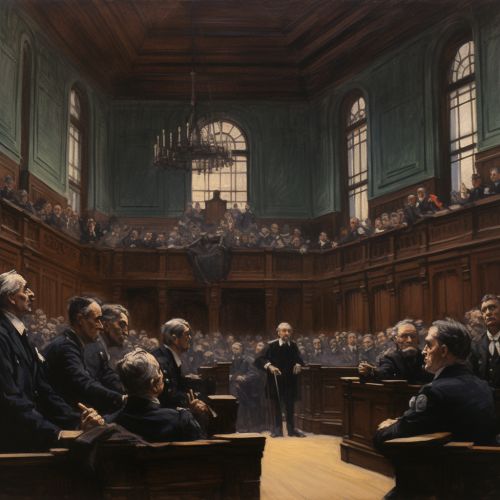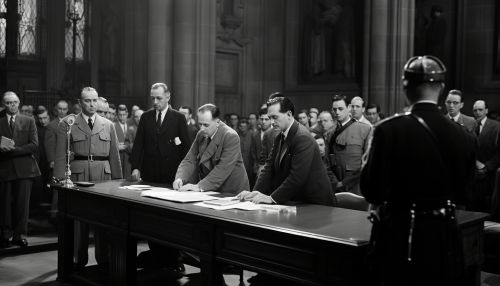Nuremberg Trials
Background
The Nuremberg Trials were a series of military tribunals held after World War II by the Allied forces under international law and the laws of war. They were most notable for the prosecution of prominent members of the political, military, judicial, and economic leadership of Nazi Germany who planned, carried out, or otherwise participated in The Holocaust and other war crimes. The trials were held in the city of Nuremberg, Germany, and their decisions marked a turning point between classical and contemporary international law.


Origins
The idea of a war crimes trial was first proposed by the governments of the Allied forces during World War II. In 1943, Churchill, Roosevelt, and Stalin issued a joint statement affirming that the Germans would be held accountable for their war crimes. This led to the establishment of the United Nations War Crimes Commission (UNWCC) in October 1943.
Legal Basis
The legal basis for the jurisdiction of the court was that defined by the Instrument of Surrender of Germany. This instrument stipulated that the supreme authority with respect to Germany was exercised on behalf of the Allied Powers. The judicial function of this authority was exercised by the International Military Tribunal.
Indictments
The major war criminals' trial was held before the International Military Tribunal, and it tried 24 of the most important captured leaders of Nazi Germany. They were charged with four counts—conspiracy to commit crimes, crimes against peace, war crimes, and crimes against humanity—in violation of international laws governing warfare.
Judgments
The tribunal passed out sentences ranging from death by hanging, to life imprisonment, to imprisonment for a term of years. Of the 24 defendants, 12 were sentenced to death, 3 were acquitted, 7 were given prison sentences ranging from 10 years to life, and 2 were not sentenced.
Impact
The Nuremberg Trials had a great influence on the development of international criminal law. The trials were a model for the International Criminal Court, and they led to the establishment of the Genocide Convention and the Universal Declaration of Human Rights.
Criticism
Despite their historical significance, the Nuremberg Trials have been subject to criticism, including questions about the legality of the court, the fairness of the trials, and the perceived victor's justice.
